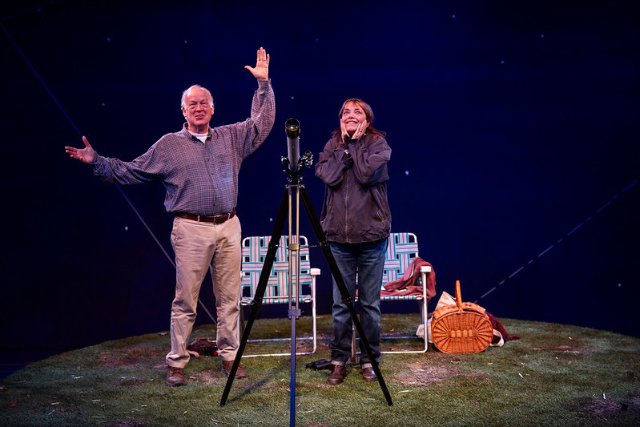Lunar Eclipse By Donald Marguiles
World Premiere at Shakespeare & Company
By: Charles Giuliano - Sep 18, 2023
Lunar Eclipse
By Donald Marguiles
Directed by James Warwick
Set, John Musall; lighting, James McNamara; Costumes, Christina Beam; Sound, Nathan Leigh
Cast: Karen Allen (Em), Reed Birney (George)
Elayne P. Bernstein Theatre
Shakespeare & Company
Lenox, Mass.
September 15 to October 22
World Premiere
Lunar Eclipse, a taut, mordant, melancholy two-hander by the renowned playwright, Donald Marguiles, is having its world premiere, directed by James Warwick, at Shakespeare & Company. It’s a prestigious coup for artistic director, Allyn Burrows.
The spare set designed by John Musall, is a flat carousel with Astroturf and a scattering of natural detritus. It simulates a field on the farm of George which has been passed down from his grandfather. On a folding chair with a bottle of hooch he is there to observe a lunar eclipse and drown his sorrows. He sinks into bathos illuminated by the light of an approaching car.
Apparently uninvited his wife of some five decades, Em, arrives with her chair, a picnic basket, blankets and a coat for him. Awkwardly they settle in to share their second eclipse, from when they courted as teenagers, which is oddly tacked on to the end of the play.
Over 95 minutes, calibrated to phases of the eclipse marked by incremental rotations of the set, the repressed pain and desperation of scenes from a marriage play out. He is content and resolved with a farmer’s life. She, evidently not so, leading him to ask why?
The short form answer is that she loved him and accepted the role.
While the overall mood of the play is melancholy and remorseful Marguiles inserts much appreciated comic relief. These are withdrawn and difficult characters to relate to. George is particularly gruff, harsh and prickly to embrace. Both characters are written and played with remarkable depth which unwinds as incrementally as the phases of the eclipse. The direction of Warwick keeps it nicely restrained, focused and on track.
Picking at each other’s scabs, when pressed, Em states that she doesn’t like planting time.
After a reflective pause, she adds, disdaining harvest then with stutter steps, summer and winter. That earned laughter from the audience which settled with his deeply felt response. He loved planting season and the miracle of watching seeds grow.
With naked eyes they watch the progress of the eclipse which he explains to her in detail. As a youngster he had a passion for astronomy and he goes off on the loss of his treasured telescope. Their adopted son Tim, whose mother was an addict, pawned it for a fix, along with other items including her mother’s amethyst earrings. They have a beloved adopted daughter, Maryann, who left the farm as soon as she could.
When Em refers to "Poor Tim" he explodes. He's Tim, just Tim and not "Poor Tim." It's implied that his addiction and OD at 36 was congenital. George reflects that isolated on a farm in rural America there is an illusion of escape from urban blight. The Sackler Family has dispelled that delusion.
Much of his morose drinking is about loss and failure. While expressing her own grieving she has done her best to console him but he is largely impenetrable.
George says to Em, “I never thought of myself as being cold. I’m a loving person. Aren’t I? Capable of showing affection?”
“Yes,” she replies, “To your dogs, especially.”
It seems in the opening scene George was weeping, not over his son, but for the dog he put down. The field they are on he describes as “Gettysburg.” It is hallowed ground and final resting place of all the family dogs dating back to his grandfather. There is a soliloquy to the faithful and unquestioning love of man’s best friend, in the case of George, contrasting harshly to Em and the family.
There are other monumental reveals as Margulies rolls out the blockbuster issues of end and quality of life as well as legacy. That struck a universality that resonated with the largely elderly audience.
George is convinced that he has early onset Alzheimer’s and proclaims that they will die three days apart in the next twenty years. He of dementia in assisted living and she of ovarian cancer. Given their barren marriage that’s a particularly devastating and symbolic prognosis.
Then there is the matter of legacy. There is no son to pass the farm onto. He speculates that their daughter will cash in and sell the land to Walmart or a developer.
It gets grim and could be oppressive. Birney and Allen, however, interact remarkably with nuance and depth. Ultimately their characters penetrate and matter deeply to us. With masterful lightness Warwick has given them space and developed their palpable individuality. This play invades and lingers with us long after we have left the theatre.


